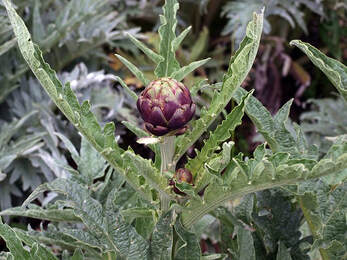 Artichoke leaf, a great digestive bitter. Artichoke leaf, a great digestive bitter. The long term use of stomach acid-lowering drugs such as proton pump inhibitors (PPIs) in the cystic fibrosis (CF) population, both adults and children, has been common for approximately 20 years. Today, more than 50% of CFers are using PPIs[i]. They are used for two main reasons: to treat gastroesophageal reflux and to improve supplemental pancreatic enzyme activation, particularly lipase. However, there are flaws in the reasoning for use of acid-lowering drugs in both of these situations. Firstly, the cause of reflux is not excessive secretion of stomach acid but dysfunction of upper gastrointestinal (GI) motility and secretions[ii], and further reducing gastric acidity with PPIs or antacids will further exacerbate reflux, causing a dependency on the drugs and worsening symptoms over time. Furthermore, the long-term use of PPIs has significant and far-reaching side effects that can negatively affect CF prognoses. Secondly, although several preliminary studies have demonstrated that the pH of the duodenum can be too low to provide the right environmental for supplemental pancreatic enzyme activation, it is not completely clear that bicarbonate secretion is inadequate in all cases, even if steatorrhea is present. A 2014 Cochrane Review of the use of PPIs in CF found that related clinical trials were not only biased, but showed zero or overall insignificant improvement in gastrointestinal symptoms[iii]. In fact, there may be other mechanisms at play within the duodenum that cause steatorrhea and contribute to low duodenal pH, namely inadequate bile secretion, possibly due to a diet low in bitter plant constituents. Here, I will discuss the issue of gastroesophageal reflux disease (GERD) in CF and the negative consequences of using PPIs to treat it. I will also discuss the many negative side effects of long term PPI use in the CF and general populations. In addition, I will discuss the low bicarbonate theory in its relationship to pancreatic enzyme activation, and how the use of PPIs may not be helpful in this situation. Lastly, I will discuss the role of bitter plant constituents in stimulating release of GI hormones and bile in the duodenum, their relationships to macronutrient absorption, and how the use of bitter tastants in the CF population may kill two birds with one stone: addressing GERD by correcting gastric sphincter function and GI secretions, and improving lipase activation by stimulating release of bile which emulsifies fats and stimulates bicarbonate secretion.
1 Comment
|
Author
Mica (they/he) is a clinical herbalist, nutritionist, researcher, and writer living in Abenaki territory (Vermont). *************************** Disclaimer: The content of this website and blog is for educational purposes only and should not be considered medical advice. The information provided here is not intended to replace medical care. Archives
July 2024
Categories
All
|
Photo from BotanikGuide
 RSS Feed
RSS Feed
